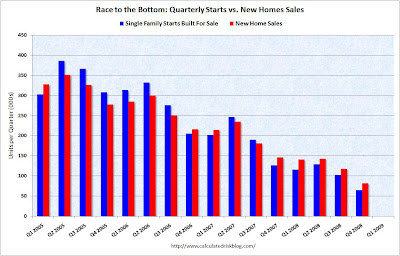John Nash, played by Russell Crowe in the movie
A Beautiful Mind, was a mathematician awarded the Nobel Prize in Economics. One of his most famous insights was something called a "Nash Equilibrium." Basically, Nash argued that an individual will do what is best for himself given that his "opponent" chooses what is best from them. More generally, I will choose the course of action that is best for me conditional on what you choose.
The classic example of a problem like this is something called a "
Prisoner's Dilemma." From the Wikipedia site, here is a description of the problem:
Two suspects are arrested by the police. The police have insufficient evidence for a conviction, and, having separated both prisoners, visit each of them to offer the same deal. If one testifies (defects) for the prosecution against the other and the other remains silent, the betrayer goes free and the silent accomplice receives the full 10-year sentence. If both remain silent, both prisoners are sentenced to only six months in jail for a minor charge. If each betrays the other, each receives a five-year sentence. Each prisoner must choose to betray the other or to remain silent. Each one is assured that the other would not know about the betrayal before the end of the investigation. How should the prisoners act?
Obviously, both suspects would be better off is they each kept their mouth shut (we call this the social optimum). (This is why your momma always separated you and your brother to get to the truth.) But, Nash and others recognized that each had an incentive to rat out the other party. Because I assume that you will do what is in your best interest (rat me out), I act in my own best interest given that assumption (rat you out). So, while the social optimum is to keep quiet, the individual incentives of ratting out are quite powerful.
Roll out climate change (or any
common-pool resource problem for that matter).
IF climate change is a real man-made issue, and that is very
debatable, is has characteristics of a common-pool resource. That is, my actions have an impact on you and
vice versa, but we act independently. If neither of us pollute, we will both have positive economic growth with positive health impacts. If one of us pollutes but the other does not, the one that does not will have higher economic growth (hence, the incentive to not adopt pollution controls), while the non-polluter will have lower economic growth. The negative health consequences are affecting both of us. Thus, while we would both be "better off" by not polluting, the incentive is to pollute.
OK, so what does this have to do with "one-world government." Admittedly, that is a bit hyperbolic. But, notice in the original prisoner's dilemma game that there is no in-game communication (no tapping "just keep quiet" in morse code through the prison walls). This means that because we act individually, we will not reach the social optimum without communication. A recent article in the
New Yorker Magazine had an interesting quote on this subject.
“We are in an era of creative destruction,” he said. A thin, easygoing man with the look of an Oxford don, Elkington has long been one of the most articulate of those who seek to marry economic prosperity with environmental protection. “What happens when you go into one of these periods is that before you get to the point of reconstruction things have to fall apart. Detroit will fall apart. I think Ford”—a company that Elkington has advised for years—“will fall apart. They have just made too many bets on the wrong things. A bunch of the institutions that we rely on currently will, to some degree, decompose. I believe that much of what we count as democratic politics today will fall apart, because we are simply not going to be able to deal with the scale of change that we are about to face. It will profoundly disable much of the current political class.” [my emphasis added]
Interesting... Basically, this person is arguing that a command-and-control dictatorship, or at least some significant modification to our representative republic (it really irks me when liberals refer to it as a "democracy" because it is NOT) will have to arise because of the prisoner's dilemma problem. Could be, but in-game communication can be accomplished in many ways, which short-circuits the problem. Additionally, economic research suggests that players of the prisoner's dilemma game often choose to "cooperate" as much as 40% of the time even though it runs counter to their individual incentives. Nevertheless, this might explain why the liberal left continue to push the global warming agenda...how else to get you to accept sacrificing self-government unless there is a "crisis too big to solve" as individual nations.































